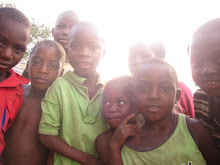An interesting article from un.org providing even more motivation to address HIV/AIDS as part of my volunteer experience.
Special thanks to Aleks from my WorldTeach group for passing this along.
HIV-positive youth in Namibia, Tanzania need greater support from schools – UN
23 December 2008 – Children and young people living with HIV in Namibia and Tanzania are not getting the kind of moral support they need to further their education, according to the first United Nations report commissioned specifically on the learning needs of this vulnerable group.
“Supporting the educational needs of HIV-positive learners: Lessons from Namibia and Tanzania” calls for stepping up support for students living with HIV, noting that the extent of the failures of educational institutions in the two countries are being “masked” by gaps in data and a lack of research.
It identifies the challenges facing educational institutions who want to respond to the needs of children and young people living with HIV and makes recommendations and guidelines on how best to support them.
One of the most striking findings of the report, released by the UN Educational, Scientific and Cultural Organization (UNESCO), is the pervasive stigma and discrimination faced by children living with the infection.
“Every HIV-positive child interviewed in both Namibia and Tanzania described personal and ongoing experience of the negative consequences of disclosing their HIV status,” according to a news release published on the website of the Joint UN Programme on HIV/AIDS (UNAIDS).
“Each felt that there was greater safety in keeping silent. Stigma was described as ‘more killing’ than the disease itself,” it added.
The studies found that the information on HIV shared in schools was often “depersonalized and remote from the needs of the individuals infected and affected by the disease.”
There was also a “lack of effective communication” about sex or reproductive health, with the subject treated ‘flippantly’ in many schools.
At the same time, the report did find evidence of reduced school fees and expanded feeding schemes for children orphaned or made vulnerable by HIV as well as children living with HIV, which it believes suggests that “things are getting better.”
UNESCO recommends focusing on specific interventions for HIV-learners, in addition to ensuring the equitable delivery of accessible, quality education for all children.
26 December 2008
Subscribe to:
Post Comments (Atom)




1 comment:
Jim,
I will keep you and your mission in my prayers. You are going where many would not, but where many are needed.
Keep teaching and trusting that this is what God meant for you to do.
Take care of yourself, Korrine
Post a Comment